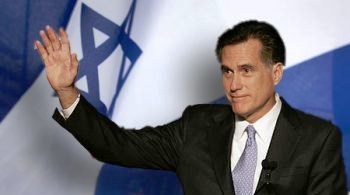
Mitt Romney’s Passion for Israel
Former Massachusetts Governor Mitt Romney’s two-day visit to Israel, which began on Shabbat and continued through the Tisha B’Av day of mourning, had initially raised some eyebrows regarding the appropriateness of its timing. Concerns were raised in Jerusalem and among supporters over whether the Romney campaign was out of touch with Israel and the Jewish people.
However, in the aftermath of his stirring remarks overlooking the walls of Jerusalem’s Old City, followed by an unusually warm meeting and “break the fast” meal with Prime Minister Benjamin Netanyahu and his family and another smaller meeting that I attended, it seems clear that Romney embraces Israel with the same passion that characterized George W. Bush’s historic May 15, 2008, Knesset speech (notwithstanding the differences between an incumbent president and a presidential candidate).
Romney was reportedly so moved by his visit to Jerusalem’s ancient City of David, accompanied by director Doron Spielman, that he practically ordered his wife, Ann, son Josh, brother and sister-in-law to visit the ancient archeological site the following day at midnight, the only time slot they could arrange. Recapping their visit, a Romney delegation member noted to me the following morning that the emotional power of visiting the original ancient capital of Israel on the day that commemorated Jerusalem’s destruction brought tears to Ann Romney’s eyes. “Despite the lack of sleep, when you see the archaeological evidence of Israel’s ancient capital, history becomes very clear,” he said.
This moving encounter with Israel’s archaeological past may help explain why Romney applauded twice during Jerusalem Mayor Nir Barkat’s introduction of him, in which the mayor welcomed the governor to “Jerusalem, the eternal, undivided capital of the State of Israel.”
Romney followed Barkat’s lead, noting within the first minute or two of his talk how moving it was for him to be in “Jerusalem, the capital of Israel.” While he omitted the word “undivided,” it was still a risky moment for Romney. He has subsequently drawn the ire of the Obama administration for his break with current U.S. policy, which Obama enshrined in his May 2011 address when he called on Israel to live in the curtailed 1967 lines. This line was a sharp break from the policy of U.S. administrations since the 1967 Six-Day War.
Clearly, Romney, the presumptive Republican presidential candidate, was “on message.” In fairness, U.S. President Barack Obama had also said in June 2008, six months prior to the U.S. presidential elections that “Jerusalem will remain the capital of Israel, and it must remain undivided,” before backtracking from that position.
If elected president, Romney’s message would undoubtedly need to be put to the test. However, his emphasis on shared values, history and destiny throughout the two-day visit seemed to reach beyond the standard political message of a U.S. presidential candidate. He reiterated a central theme of his speech, saying that “for an American abroad, you can’t get much closer to the convictions and ideals of my own country than you do in Israel.”
In addition to publicly backing Israel’s rights to Jerusalem, Romney also focused on Israel’s right to defend itself against the Iranian regime’s nuclearizing terror and ballistic missile threats. Notably, however, he did not mention the Palestinian-Israeli conflict. Moreover, Romney’s reported comparison of Israel’s successful entrepreneurial culture versus that of the Palestinians angered the Palestinian Authority leadership. His observation was made in the context of his praising the American entrepreneurial culture versus that of some of its southern neighbors. It also reflected the more peripheral significance Romney has accorded the Palestinian issue as compared to larger regional threats confronting the Western alliance at the hands of the Iranian regime, its proxies and fellow travelers — Syria, Hezbollah, Hamas and other Islamist groups. Markedly, Romney met with Palestinian Authority Prime Minister Salaam Fayyad, but not with PA President Mahmoud Abbas. They met in Jerusalem, not Ramallah. There was no photo-op.
Campaign rhetoric aside, Romney’s Israel visit brought a central part of his foreign policy worldview into sharper focus. He sees Israel playing a frontline position in the future of America’s vital interests in the Middle East that are anchored in the Western alliance overcoming the Iranian regime’s nuclear and terror threats that U.S. Defense Secretary Leon Panetta noted has continued to march forward despite mounting sanctions and diplomatic pressure.
Indeed, as the sun set over Jerusalem, marking the end of the Tisha B’Av commemoration and fast, Romney said that since his last visit to Israel in 2007, “the regime in Iran is five years closer to developing nuclear weapons capability. Preventing that outcome must be our highest national security priority.”
Written by Dan Diker who is the secretary-general of the World Jewish Congress.


